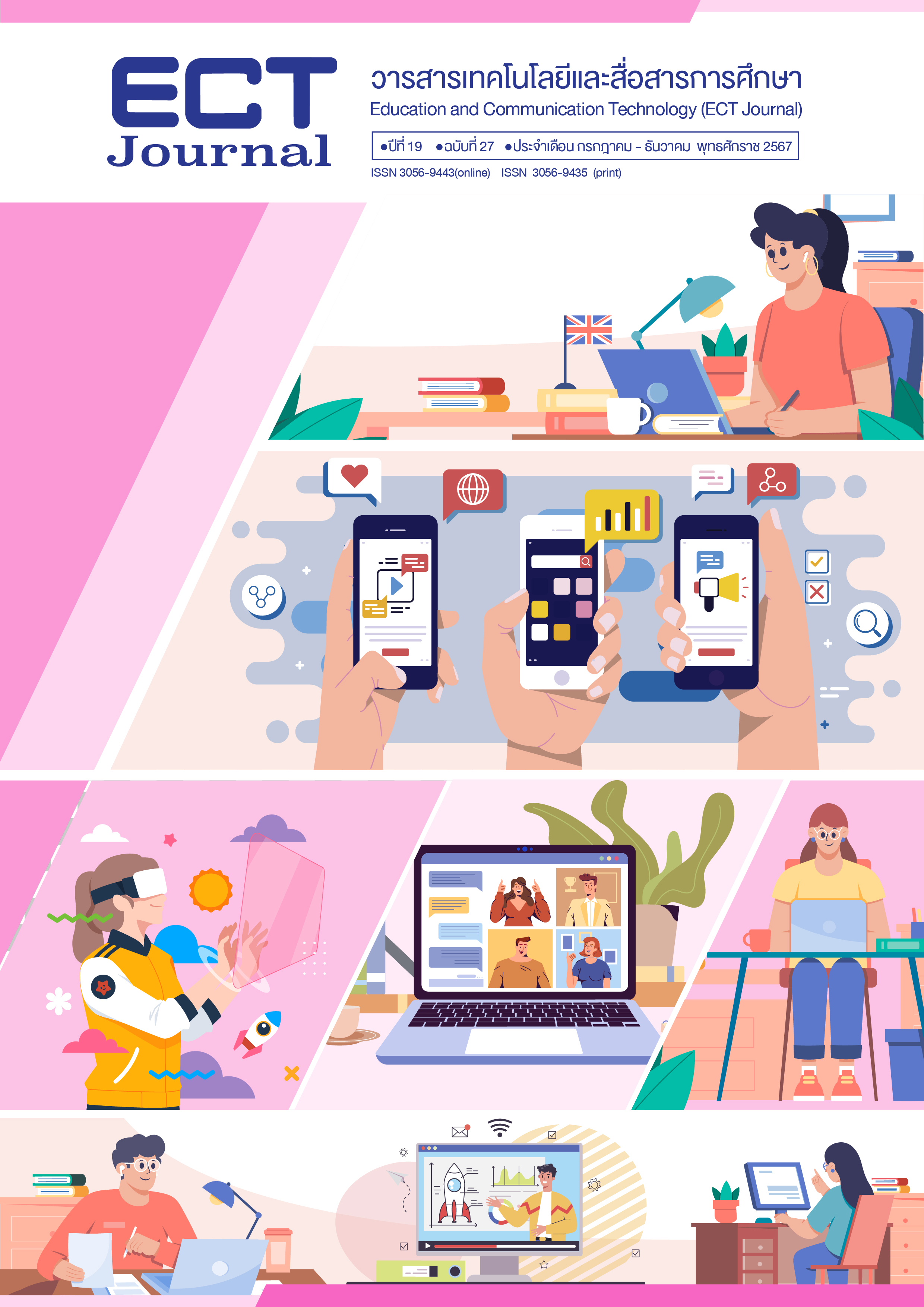The Effect of a Mobile Computer-Supported Collaborative Learning Model Using Phenomenon-Based Learning to Enhance Pre-Cadet Students' Scientific Competencies
Keywords:
Mobile computer-supported collaborative learning, Phenomenon-based learning, Scientific competenciesAbstract
The purpose of this research was to study the impact of a mobile computer-supported collaborative learning model using phenomenon-based learning aimed at enhancing pre-cadet students' scientific competencies. The sample consisted of 33 pre-cadet students selected through simple random sampling by the lottery method. The research instruments included a learning model and scientific competency assessments. The experiment period lasted 5 weeks. Data were analyzed using mean, standard deviation, and One-way ANOVA with repeated measures. The results showed that the scientific competencies of pre-cadet students differed significantly at the .05 level between the 1st, 3rd, and 5th assessments.
References
พิชญ์วดี กิตติปัญญางาม. (2564, 1 เมษายน). Phenomenon Based Learning: วิเคราะห์เป็น ชีวิตดี มีความสุข เปิดหลักสูตรการเรียนรู้แบบฟินแลนด์. http://iamkru.com/2021/04/01/phenomenon-based-learning-วิเคราะห์เป็น-ชีวิตด/
สถาบันส่งเสริมการสอนวิทยาศาสตร์และเทคโนโลยี. (2563). ความฉลาดรู้ด้านวิทยาศาสตร์. Pisathailand.
สถาบันส่งเสริมการสอนวิทยาศาสตร์และเทคโนโลยี. (2564). ผลการประเมิน PISA 2018 การอ่าน คณิตศาสตร์ และวิทยาศาสตร์. http://drive.google.com/file/d/1YJPcpAk6FfQb9RP3FBumLvZIgDgOpTUo/view
Akkas, E., & Cevat, E. (2021). The effect of phenomenon-based learning approach on students metacognitive awareness. Educational Research and Reviews, 16(5), 181-188. https://doi.org/10.5897/ERR2021.4139
Albó, L., Hernández‐Leo, D., & Vanleer, O. (2019). Smartphones or laptops in the collaborative classroom? A study of video-based learning in higher education. Behaviour & Information Technology, 38(6), 637-649. https://doi.org/10.1080/0144929X.2018.1549596
Amini, S., & Sinaga, P. (2021). Inventory of scientific literacy ability of junior high school students based on the evaluation of PISA framework competency criteria. Journal of Physics: Conference Series, 1806(1). https://doi.org/10.1088/1742-6596/1806/1/012017
Bada, S. O., & Olusegun, S. (2015). Constructivism learning theory: A paradigm for teaching and learning. Journal of Research & Method in Education, 5(6), 66-70. https://doi.org/10.9790/7388-05616670
Bringula, R. P., & Atienza, F. A. L. (2023). Mobile computer-supported collaborative learning for mathematics: A scoping review. Education and Information Technologies, 28(5), 4893-4918. https://doi.org/10.1007/s10639-022-11395-9
OECD. (2019). PISA 2018 assessment and analytical framework. OECD Publishing.
Santhalia, P. W., & Yuliati, L. (2021). An exploration of scientific literacy on physics subjects within phenomenon-based experiential learning. Journal Penelitian Fisika dan Aplikasinya, 11, 72-82. https://doi.org/10.26740/jpfa.v11n1.p72-82
Santosa, E. (2020). The effects of mobile computer supported collaborative learning to improve problem solving achievements. Journal for the Education of Gifted Young Scientists, 8, 325-342. https://doi.org/10.17478/jegys.656642
Sinurat, C. D., Surtikanti, H. K., & Rustaman, N. (2021). Developing of electronic learning materials based on Simalungun potency of agriculture for improving student scientific literacy competencies in environmental context and awareness. Journal of Physics: Conference Series, 1806(1). https://doi.org/10.1088/1742-6596/1806/1/012162
Sung, Y. T., Yang, J. M., & Lee, H. Y. (2017). The effects of mobile-computer-supported collaborative learning: Meta-analysis and critical synthesis. Review of Educational Research, 87(4), 768-805. https://doi.org/10.3102/0034654317704307
Valanne, E., Al Dhaheri, R., Kylmalahti, R., & Sandholm-Rangell, H. (2017). Phenomenon based learning implemented in Abu Dhabi school model. International Journal of Humanities and Social Sciences, 9(3), 1-17. https://ijhss.net/index.php/ijhss/article/view/263
Villarroel, V., Boud, D., Bloxham, S., Bruna, D., & Bruna, C. (2020). Using principles of authentic assessment to redesign written examinations and tests. Innovations in Education and Teaching International, 57, 38-49. https://doi.org/10.1080/14703297.2018.1564882
Vygotsky, L. S. (1978). Mind in society: The development of higher psychological processes. Harvard University Press.
Downloads
Published
How to Cite
Issue
Section
License
Copyright (c) 2024 มหาวิทยาลัยสุโขทัยธรรมาธิราช

This work is licensed under a Creative Commons Attribution-NonCommercial-NoDerivatives 4.0 International License.
1. ทรรศนะและข้อคิดเห็นใด ๆ ที่ปรากฏอยู่ในวารสาร ECT Education and Communication Technology Journal เป็นของผู้เขียนโดยเฉพาะ สำนักเทคโนโลยีการศึกษา มหาวิทยาลัยสุโขทัยธรรมาธิราช และกองบรรณาธิการไม่จำเป็นต้องเห็นพ้องด้วย
2. กองบรรณาธิการของสงวนลิขสิทธิ์ในการบรรณาธิการข้อเขียนทุกชิ้น เพื่อความเหมาะสมในการจัดพิมพ์เผยแพร่






